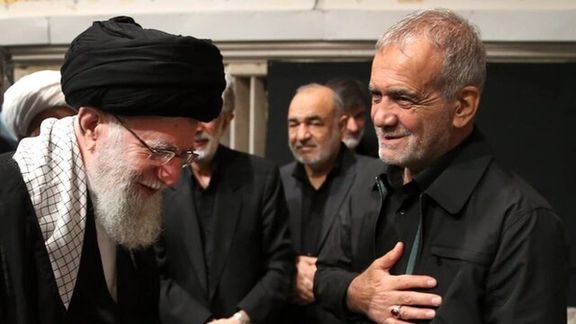The overwhelming and unprecedented vote seems more a result of President Pezeshkian leveraging Supreme Leader Ali Khamenei's influence than a genuine reflection of the parliament's confidence in the President or his ministers—many of whom were virtually unknown before being nominated by Pezeshkian, or rather, by Khamenei.
The vote of confidence followed Pezeshkian's pointed remarks at the Majles, where he revealed that all the ministers had been endorsed by Khamenei. He urged lawmakers, saying, "Do not make me say what I should not say. Just vote and let us form the cabinet!" Pezeshkian further disclosed that when Culture Minister Abbas Salehi initially refused to join the cabinet, Khamenei personally called Salehi and told him to accept the position.
Iranian observers in and out of the country concurred that this was Khamenei's cabinet. After these revelations some called Pezeshkian a prime minister rather than President of the country. Another observer said: "From reformists to hardliners, the entire regime—from top to bottom—rallied behind Pezeshkian's government. The ministers secured a vote of confidence from a deeply unpopular parliament, despite some members initially opposing them. The entire regime mobilized its resources to support the cabinet. The Pezeshkian administration now represents the full capacity of the regime. It is now their responsibility to prove that they can address the many problems they themselves have created.”
Many have pointed out that Khamenei will now be directly accountable for the new government's successes or failures. By publicly revealing that Khamenei handpicked the cabinet ministers, Pezeshkian has effectively ensured that the Supreme Leader cannot deflect blame onto others for any future shortcomings or failures.
Iranian journalist Hossein Saremi wrote: "Pezeshkian has placed the entire responsibility for the cabinet squarely on Khamenei's shoulders. If he lied, Khamenei's office should issue a denial. But if he told the truth, then those criticizing the cabinet and claiming to be more responsible or concerned for the government than Khamenei are merely deviants leveling accusations against the Supreme Leader."
Hardline lawmaker and a staunch critic of Pezeshkian, Hamid Rasai wrote that Pezeshkian's statement to gain support for his cabinet has been costly for the Supreme Leader. He added that according to Pezeshkian's remarks, the ministers must operate within the framework of higher laws, such as the Seventh Development Plan and the general policies of the regime and the Supreme Leader.
Cleric Mohammad Mohammadi Tabar warned the Majles that it will be your fault if these ministers make a mess of the country. You have been deceived by the President who wishes to blame the Supreme Leader for the ministers' [possible] failure. “Shame on Pezeshkian!"
During the past two months Pezeshkian has been distancing himself from issues such as continued violence against women defying the compulsory hijab, the nationwide protests by nurses and pensioners and the ongoing violation of human rights including tens of executions during this period by claiming that he did not have a government to take care of the matters of state. Now, he does not have that excuse any longer.
On the other hand, if Khamenei remains silent about Pezeshkian’s claims of his involvement in nominating the cabinet ministers, or if he doesn’t temper what was said, he risks, for the first time in his 35-year tenure as Iran’s leader, becoming a direct target for potential criticism and public protests. This would be especially true if the Pezeshkian administration fails to fulfill its promises, particularly in addressing the country’s long-standing economic crisis.







